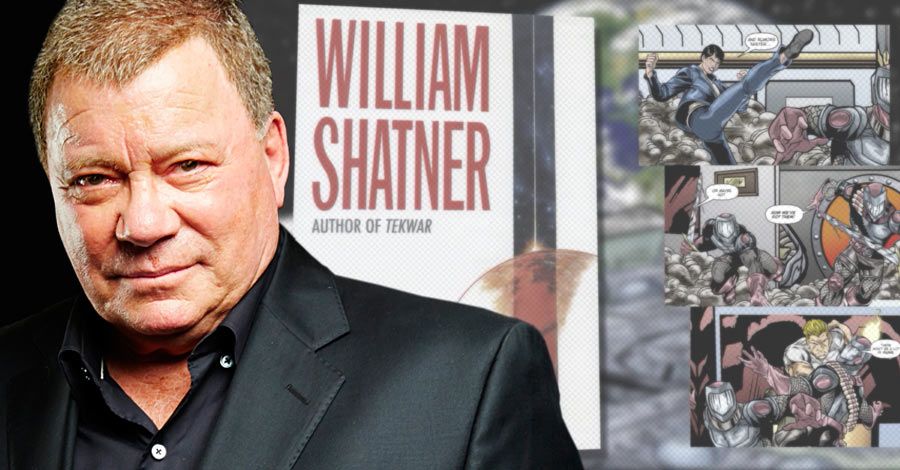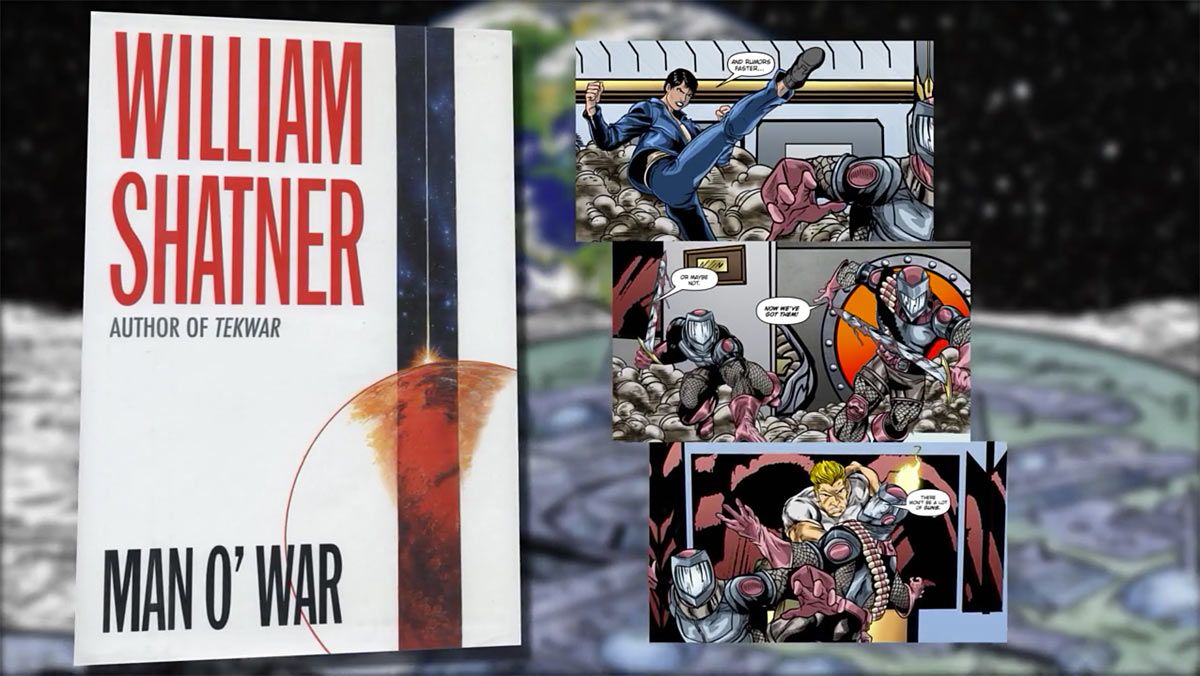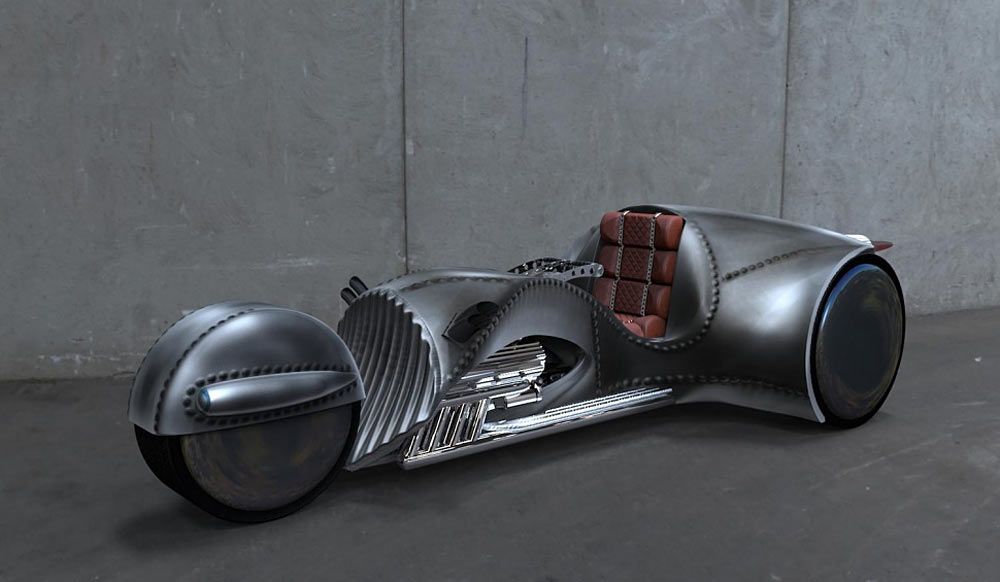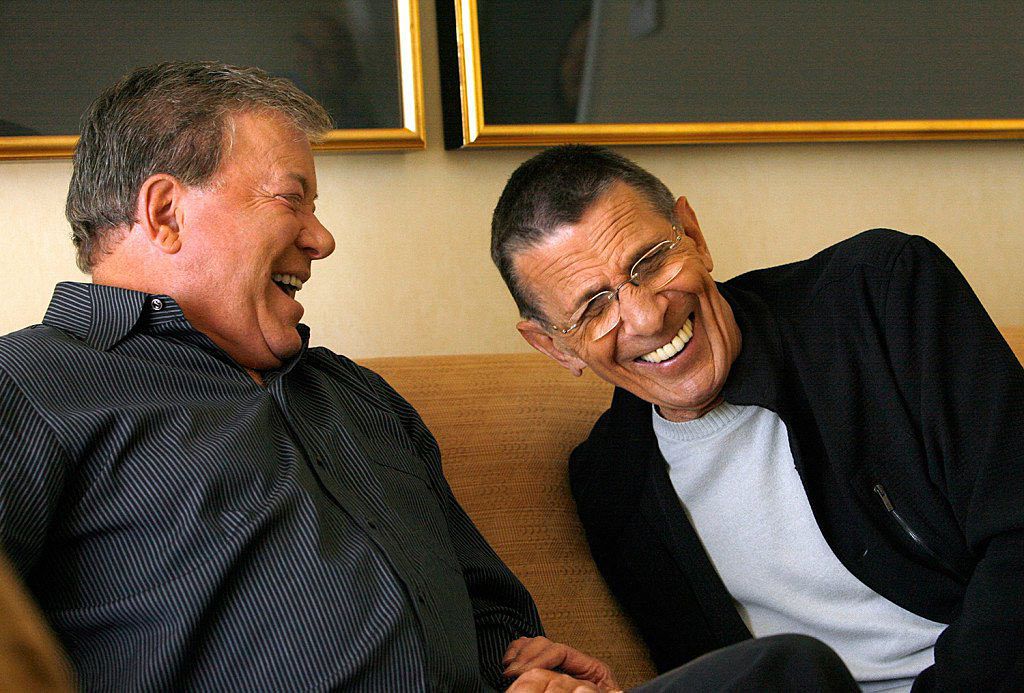For William Shatner, there never seems to be a final frontier. Even now, the legendary actor/director/screenwriter/producer/novelist/memoirist/pitchman/vocalist/horseman/social media influencer continues to find new adventures to embark on.
At 84, after over six decades on stage and screen, the iconic "Star Trek" star remains busier than many people a quarter of his age, and finding new fans with every venture. His latest creative outlet is "Man-O-War," his first-ever "cinematic graphic novel": an adaptation of his 1996 novel, "Man-O-War" has been translated into both a 16-chapter digital experience that combines story, art, animation, sound effects and music into a state-of-the-art hybrid form of entertainment, along with an accompanying traditional digital comic book series -- both launched after a successful Indiegogo campaign.
William Shatner On Leonard Nimoy, Friendship And Loss
Along with exploring a fresh new format to bring his sci-fi allegory -- a young, revolutionary George Washington-type coming into his own in a tense future -- to life, Shatner has a full slate of projects in the immediate future: today he embarks on a week-long, 2,400-mile cross-country journey from Chicago to Los Angeles riding "The Rivet," a newly designed three-wheeled motorcycle; at the end of summer he heads to Asia to film "Better Late Than Never," a "bucket list"-themed reality travel show alongside Henry Winkler, George Foreman and Terry Bradshaw for NBC; and he's currently penning a memoir chronicling the long, deep friendship he shared with his "Star Trek" co-star Leonard Nimoy, who died last February.
Somewhere in his tireless schedule, Shatner found a moment to open hailing frequencies with CBR News to discuss "Man-O-War" and his many other missions ahead.
CBR News: You've worked as a writer in so many different formats -- novels, screenplays, memoirs, fiction, non-fiction -- what got you excited and inspired about working in the comic book medium, especially with the "cinematic graphic novel" twist?
William Shatner: I think that the cinematic part of it is innovative with the sound effects and music and the motion that we're able to bring to it. And hopefully, in the future, it will also be interactive so that you can press the screen and get a portion of the book that refers to the portion of the comic that you're looking at, so you get a further explanation of what's going on from the eBook.
Was it that angle that sold you on this way to tell your story, the cinematic experience?
Yeah, I mean, there's so much innovative technology, technology that either exists, and we're using it in a different way, or that doesn't exist and we're trying to find ways to do it. That makes this quite different from anything else. That was what made me feel great about everything.
You've written certainly written in the science fiction discipline before. I'm curious about what sparked the idea for the story that you tell in this unique way.
Well, the book talks about revolution, and how the problems [arose] -- in this case, the miners went to Mars with the expectation of sharing in the profit in the backend, as we say, and there was never any profit so the children wanted to rebel. Then, in the book, I want to follow the American Revolution, so that it is a colony that's breaking away from the mother country -- but my intention, given the chance, would be to animate aspects of the American Revolution, [George] Washington's struggle and early losses.
And by using cunning and guile to make his victories and doing the unexpected because its dearth of the men and munitions, I wanted to repeat that in this. And the idea of a man who spent his life ameliorating disputes and finally is sick of sitting on the fence, wants to have an opinion of his own, and finds that passion in the youth of Mars, and then becomes their George Washington, leads them on to eventual victory.
So all of those things intrigued me in the book. And then when I had the opportunity, I had this idea of motion in visualization of the book with this motion capture, if you will. I had seen a radio show, the comic from England, who had done a radio show. And they would just splash pictures on television. I thought, I can do that much better. And an opportunity presented itself with these individuals, Mariano Nicieza being the opportune moment -- he's the brains behind this LNL [Partners, the digital company behind the release]. And all of that came together, and this is the result.
Nobody understands the power of science fiction as allegory better than you. What do you still love about that aspect of telling stories that talk about something else disguised as the fun science fiction clothing?
Well, that's it. It's the fun of imagining what the future will hold. We're all going to die, no matter what age we are. We're all going to die well before any of the things science fiction writers are imagining. And there's a desperation to know what the future holds. What will it be like for my children? Or my children's children? And to assuage that longing, you let your imagination roam and create a world that may or may not exist.
Did comic books ever loom large for you at any point during your youth?
I would read them -- Superman and Batman -- in my bed with a flashlight, long after I was supposed to be asleep when I was a kid. I was involved with comic books when they were being invented, I guess. I didn't know they were being invented, but apparently, that's what was happening.
Because of your stature in the worlds of people who love science fiction and also people who love science, I imagine that you're able to get close to people who are really on the cutting edge of technology. Has that influenced your writing and storytelling?
Well, I'm not connected with the people, but I'm reading a lot about -- what everybody else can read -- new thoughts and new discoveries, new theories in the magazines that are available to all of us, "Discovery" and "Modern Science" and all those magazines. I read them quite assiduously and find ideas in them because it's essentially that's what science fiction writers are doing, taking laboratory theories and theses and making them real, extracting a reality from them.
One of the things I liked was I enjoyed the way you juxtapose a very high tech world opposite a very traditional low-tech naturalistic world with barns and mountain ranges and horses and dogs. It reminded me of the similar juxtapositions in your film "Star Trek V." Is that an intriguing theme for you?
Yes, only because that brings it to reality. We're all products of 5 million years of evolvement, and we're not going to lose that in 200 years. So that although we may get around and use our fingers to move massive quantities of whatever, we're still going to need love and nourishment and be part of the Earth because that's from whence we sprang. So the more we can tie our characters to the real world, the more reality it brings to the unreal.
Since you were very, very young, you've been an actor, you've been a storyteller. And you seem to have ceaseless energy. What keeps you excited and motivated in your creativity and your professional career?
Well, I think it's the act of creation. The excitement of coming up with an idea and saying, that could work. And taking a one-line idea and branching from it. So the stem of an idea becomes the origin of the many branches that a story can bring. That's exciting to me. That's where I do best. And so I live for those ideas. Something occurs to me, and I think, 'that would work.' And then I press forward, and luckily, I have opportunity to take some of those ideas to fruition. Whereas so many other people have a great idea but it dies with them.
And you get to do this in your life as well. Tell me about this cross-country trip you're about to embark on.
Well, I'm signing autographs in Chicago a couple years ago. And the guy comes up to me and says, "We'd like to make you a motorcycle." So I'm a motorcycle enthusiast. And I said, "Great!" So then two weeks or so, a few weeks later, a friend of mine who is a sculptor, whose work I commissioned around my house said, "I want to sculpt a motorcycle that would look good in the Museum of Modern Art." And he had a couple of sketches. And I said, "That's great. I have a company, named American Wrench out of Chicago who wants to build a motorcycle." So I put all of us together. And eventually, the sculptor dropped out, but I had met these wonderful people at American Wrench.
So now we began our own design in which I had several specifications based on my needs as a writer. And they began to sketch these bikes, and they had a great designer there. And suddenly, this motorcycle took form, and then we began to say, "Well, how much horsepower?" And these enthusiasts in Chicago said, "Well, we'll put a 500 horsepower Cadillac engine in it." That blew my mind. And so now, there's this giant bike, bat-like bike with a 500 horsepower engine. And I said, "Well, you know" -- like, on a fling -- "I'll drive that bike from Chicago to Los Angeles." And they said, "Great. That will sell bikes."
And I said, "Well, wait a minute. Why don't we film it? And I'll go sell that show." Well, I couldn't sell the show because they kept saying, "What's the show about?" And I kept saying, "I don't know. I'm going to visit a lot of people, talk to a lot of people. We'll film the ride and the people, and it will be a show." They said, "Well, come back when you've got it." So we don't have a backer. We're self-financing this thing.
And it seemed like a good idea at the time, and it has blossomed into three calls to "The Today Show," getting Al Roker to give us the weather along the way. Because the weather -- I was doing publicity on Monday on "The Today Show" and I hear him say, "There's 12 inches of rain coming up off the gulf, and flooding Amarillo" -- which is one of those stops that we have. And I'm like, "God..." So I started talking to him on the air, and we've arranged off the air for me to make continuous calls to Al early in the morning, to find out what the weather is going to be like on our next stop.
So we've got all kinds of fortuitous things happening publicity-wise and story-wise, people-wise. And rather something that's planned, although we have a lot of planning -- where we're stopping and where we're gassing up and places we're going to visit -- there's a lot left unplanned. And that's taking place right now, even as we speak. People are adhering to our little escapade.
Tell me about this new show, "Better Late Than Never." That also sounds very fun.
Well, four of us are going to be in Asia for the month of August, essentially, and blunder our way through five countries, and everybody's amusing there. And it should be a lot of fun. And it will be on the air, I don't know, in late Fall or Winter on NBC.
RELATED: "Star Trek" Legend Leonard Nimoy Passes Away
You are of course aware of tremendous outpouring of appreciation and admiration from the public upon the passing of your dear friend Leonard Nimoy, who was always very, very generous to me as a journalist...
He was generous to a lot of people.
I want to get your sense of his legacy -- to you as a friend, and what you think his big legacy is going to be in the long run.
Well, I'm writing a book about him, about Leonard and friendship. And he might have been my dearest friend, and we had a lot of -- I guess the word "fun" applies to it -- in living our lives alongside each other. His background is not unlike mine. His marital life was very much like mine. He had children. I had children. And we had many of the same problems and advantages. And so we had a lot in common. And we made each other laugh a lot. And that's what my book is going to be about: about friendship.
Shifting gears a bit, I wanted to find out about the fun you're having with social media, and what that's meant to you to have such a great, active presence there.
Well, it's an attempt to be relevant in this new world that is taking place in front of us. The kids of 25 and less are totally adept at social media, which are extensions of their fingers. And out of their fingertips comes all this information -- both in and out. And everybody over 25, the older you get, the more solidified you are in negating it. And I want to find a way of making all that palatable to people like me, who can connect with a lot of interesting and different people. And out of that, comes a great benefit, which is information, acquaintanceship and, in my case, we raise a lot of money for charities in guiding people to those charities.
Did you ever imagine at this stage in your professional life, you would be as relevant, if not more relevant than ever in the way that you currently are?
At no point in your life do you expect to die. Even when death is, obviously, not too far away. You think of yourself as immortal. It's not going to happen. And so I never thought much about what I was going to be like. I was having too much fun in the present. And now that I look ahead, I shield my eyes and stay in the moment because the future is something that I don't want to contemplate.
Shatner begins his cross country ride on "The Rivet" starting June 23.





